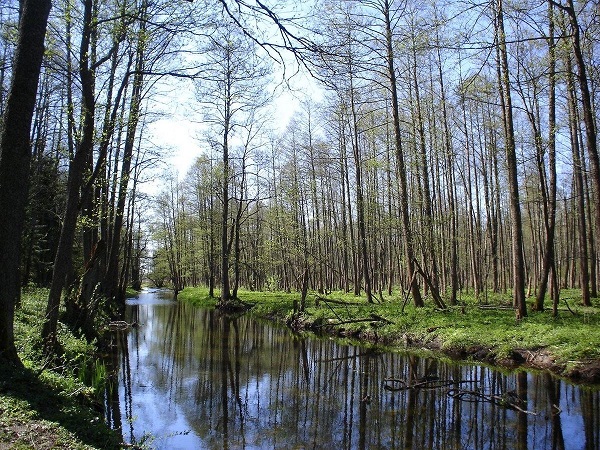Summary | Excerpt | Reading Guide | Reviews | Beyond the Book | Read-Alikes | Genres & Themes | Author Bio

This article relates to The Extinction of Irena Rey
 In Jennifer Croft's The Extinction of Irena Rey, humans' domestic and professional concerns mix with those of the natural world against the background of the vast Białowieża Forest, beside which the titular author lives and hosts a personal entourage of translators. The Białowieża Forest is a complex of woodland covering 141,885 hectares (almost 550 square miles) across the border between Poland and Belarus. Located on the watershed of the Black Sea and Baltic Sea, it consists of a mix of the remaining parts of several primeval forests. Due to its unique preservation status and biodiversity, it has been designated a UNESCO World Heritage site. According to the World Wildlife Fund, Białowieża is "the best preserved forest ecosystem and the last low-land deciduous and mixed old-growth forest in Europe."
In Jennifer Croft's The Extinction of Irena Rey, humans' domestic and professional concerns mix with those of the natural world against the background of the vast Białowieża Forest, beside which the titular author lives and hosts a personal entourage of translators. The Białowieża Forest is a complex of woodland covering 141,885 hectares (almost 550 square miles) across the border between Poland and Belarus. Located on the watershed of the Black Sea and Baltic Sea, it consists of a mix of the remaining parts of several primeval forests. Due to its unique preservation status and biodiversity, it has been designated a UNESCO World Heritage site. According to the World Wildlife Fund, Białowieża is "the best preserved forest ecosystem and the last low-land deciduous and mixed old-growth forest in Europe."
The Białowieża Forest is home to 59 mammal species, including the world's largest population of free-ranging European Bison, which were extinct in the wild by the early 20th century but reintroduced from captivity in the 1950s. It also houses numerous species of birds and some amphibians and reptiles.
One of the most notable qualities of the forest is its dead wood, which makes up a quarter of the total tree mass in the area due to the land having been left undisturbed. This large amount of decaying trees and plant matter makes Białowieża a place where fungi (3-4,000 species) and invertebrates (over 12,000 species) thrive, many of them in danger of extinction. Croft makes humorous reference to one of these rare species, the Goldstreifiger (Buprestis splendens) beetle, which Emi, Irena's Spanish-language translator, attempts to preserve only for it to be eaten by Quercus, Irena's pet parrot.
Roughly a third of the Polish part of the forest is established as a national park and strictly protected reserves, but the other two-thirds have been subject to increased logging in recent years, an issue raised directly in Croft's novel. In 2016, the Polish Environmental Minister announced plans to triple logging in the Białowieża Forest District, with the reason given that it was necessary to contain a bark beetle outbreak. Environmental groups disagreed with this logic, pointing out that such outbreaks and the dead wood they produced were a natural process that had been taking place in the forest for thousands of years. Emi explains the position of those opposed to the logging: "The forest had always found a way to heal itself, but in order to do so, it had to have biodiversity: a variety of plants, animals, and fungi that only in cooperation with each other were able to perpetuate the cycle of life. No one species could do this on its own; no two or three species could, either."
Following local and worldwide pressure from environmental groups and the media, legal action was taken by the EU Commission in 2017, and Poland was ordered by the European Court of Justice to stop logging in Białowieża until a final ruling was reached. In 2018, the court ruled the increase in logging illegal, as felling trees older than a hundred years broke EU law. However, forestry experts and others have continued to express concerns about subsequent logging and related issues, including the building of a border wall through protected areas of Białowieża ordered by Polish authorities in response to Belarus becoming a destination for refugees, a move that is both hostile to residents and migrants and disrupts the natural movement of wildlife.
In early 2024, Poland's new climate minister pledged to "get saws out of Polish forests," starting with halting planned logging in some of the country's oldest woodland areas. Augustyn Mikos, writing for Climate Home News, urges people to remain conscious of the environmental challenges Poland still faces, while also suggesting that this development is evidence that "concerted civil society pressure really works" and that "Poland's transformation can be a beacon for others: showing how people can successfully mobilise to protect the ecosystems that humanity's survival depends on."
The Białowieża Forest, courtesy of Robert Wielgórski CC BY-SA 3.0
Filed under Nature and the Environment
![]() This article relates to The Extinction of Irena Rey.
It first ran in the March 6, 2024
issue of BookBrowse Recommends.
This article relates to The Extinction of Irena Rey.
It first ran in the March 6, 2024
issue of BookBrowse Recommends.
Talent hits a target no one else can hit; Genius hits a target no one else can see.
Click Here to find out who said this, as well as discovering other famous literary quotes!
Your guide toexceptional books
BookBrowse seeks out and recommends the best in contemporary fiction and nonfiction—books that not only engage and entertain but also deepen our understanding of ourselves and the world around us.